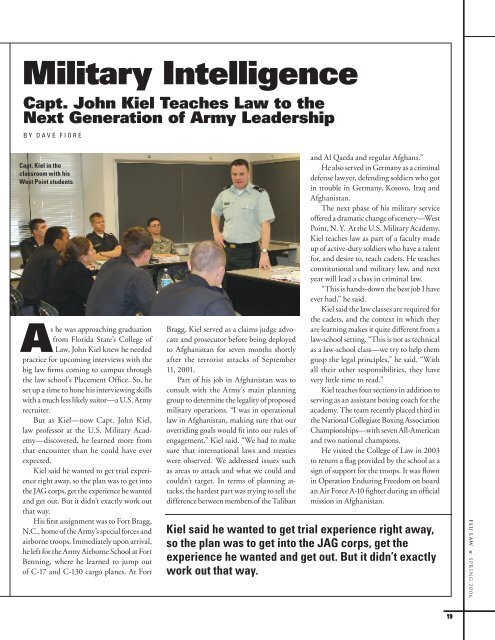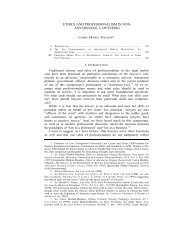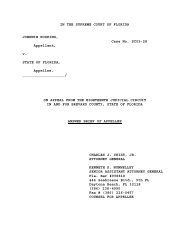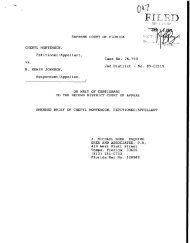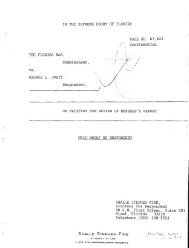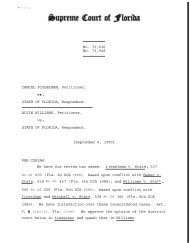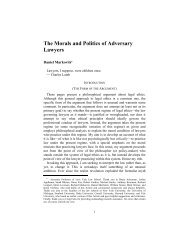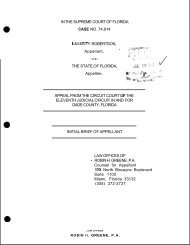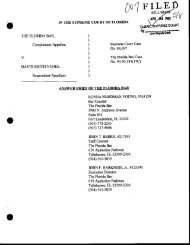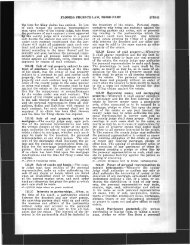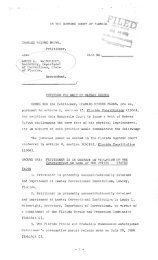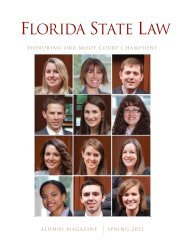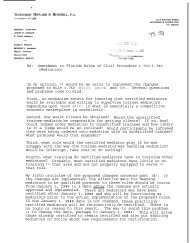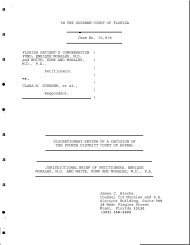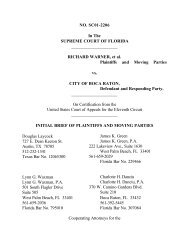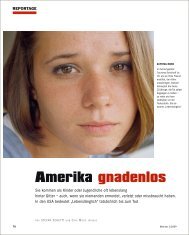Ben Crump Winning the - Florida State University College of Law
Ben Crump Winning the - Florida State University College of Law
Ben Crump Winning the - Florida State University College of Law
Create successful ePaper yourself
Turn your PDF publications into a flip-book with our unique Google optimized e-Paper software.
Military Intelligence<br />
Capt. John Kiel Teaches <strong>Law</strong> to <strong>the</strong><br />
Next Generation <strong>of</strong> Army Leadership<br />
BY DAVE FIORE<br />
Capt. Kiel in <strong>the</strong><br />
classroom with his<br />
West Point students<br />
As he was approaching graduation<br />
from <strong>Florida</strong> <strong>State</strong>’s <strong>College</strong> <strong>of</strong><br />
<strong>Law</strong>, John Kiel knew he needed<br />
practice for upcoming interviews with <strong>the</strong><br />
big law fi rms coming to campus through<br />
<strong>the</strong> law school’s Placement Offi ce. So, he<br />
set up a time to hone his interviewing skills<br />
with a much less likely suitor—a U.S. Army<br />
recruiter.<br />
But as Kiel—now Capt. John Kiel,<br />
law pr<strong>of</strong>essor at <strong>the</strong> U.S. Military Academy—discovered,<br />
he learned more from<br />
that encounter than he could have ever<br />
expected.<br />
Kiel said he wanted to get trial experience<br />
right away, so <strong>the</strong> plan was to get into<br />
<strong>the</strong> JAG corps, get <strong>the</strong> experience he wanted<br />
and get out. But it didn’t exactly work out<br />
that way.<br />
His fi rst assignment was to Fort Bragg,<br />
N.C., home <strong>of</strong> <strong>the</strong> Army’s special forces and<br />
airborne troops. Immediately upon arrival,<br />
he left for <strong>the</strong> Army Airborne School at Fort<br />
<strong>Ben</strong>ning, where he learned to jump out<br />
<strong>of</strong> C-17 and C-130 cargo planes. At Fort<br />
Bragg, Kiel served as a claims judge advocate<br />
and prosecutor before being deployed<br />
to Afghanistan for seven months shortly<br />
after <strong>the</strong> terrorist attacks <strong>of</strong> September<br />
11, 2001.<br />
Part <strong>of</strong> his job in Afghanistan was to<br />
consult with <strong>the</strong> Army’s main planning<br />
group to determine <strong>the</strong> legality <strong>of</strong> proposed<br />
military operations. “I was in operational<br />
law in Afghanistan, making sure that our<br />
overriding goals would fi t into our rules <strong>of</strong><br />
engagement,” Kiel said. “We had to make<br />
sure that international laws and treaties<br />
were observed. We addressed issues such<br />
as areas to attack and what we could and<br />
couldn’t target. In terms <strong>of</strong> planning attacks,<br />
<strong>the</strong> hardest part was trying to tell <strong>the</strong><br />
difference between members <strong>of</strong> <strong>the</strong> Taliban<br />
and Al Qaeda and regular Afghans.”<br />
He also served in Germany as a criminal<br />
defense lawyer, defending soldiers who got<br />
in trouble in Germany, Kosovo, Iraq and<br />
Afghanistan.<br />
The next phase <strong>of</strong> his military service<br />
<strong>of</strong>fered a dramatic change <strong>of</strong> scenery—West<br />
Point, N. Y. At <strong>the</strong> U.S. Military Academy,<br />
Kiel teaches law as part <strong>of</strong> a faculty made<br />
up <strong>of</strong> active-duty soldiers who have a talent<br />
for, and desire to, teach cadets. He teaches<br />
constitutional and military law, and next<br />
year will lead a class in criminal law.<br />
“This is hands-down <strong>the</strong> best job I have<br />
ever had,” he said.<br />
Kiel said <strong>the</strong> law classes are required for<br />
<strong>the</strong> cadets, and <strong>the</strong> context in which <strong>the</strong>y<br />
are learning makes it quite different from a<br />
law-school setting. “This is not as technical<br />
as a law-school class—we try to help <strong>the</strong>m<br />
grasp <strong>the</strong> legal principles,” he said. “With<br />
all <strong>the</strong>ir o<strong>the</strong>r responsibilities, <strong>the</strong>y have<br />
very little time to read.”<br />
Kiel teaches four sections in addition to<br />
serving as an assistant boxing coach for <strong>the</strong><br />
academy. The team recently placed third in<br />
<strong>the</strong> National Collegiate Boxing Association<br />
Championships—with seven All-American<br />
and two national champions.<br />
He visited <strong>the</strong> <strong>College</strong> <strong>of</strong> <strong>Law</strong> in 2003<br />
to return a fl ag provided by <strong>the</strong> school as a<br />
sign <strong>of</strong> support for <strong>the</strong> troops. It was fl own<br />
in Operation Enduring Freedom on board<br />
an Air Force A-10 fi ghter during an <strong>of</strong>fi cial<br />
mission in Afghanistan.<br />
Kiel said he wanted to get trial experience right away,<br />
so <strong>the</strong> plan was to get into <strong>the</strong> JAG corps, get <strong>the</strong><br />
experience he wanted and get out. But it didn’t exactly<br />
work out that way.<br />
19<br />
FSU LAW ■ SPRING 2006


